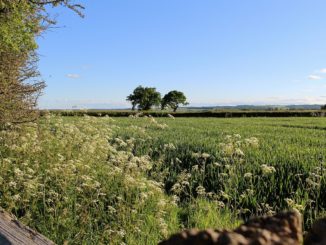In a suprise development, it has emerged that Northern Ireland’s administration will transfer, or modulate, 0% from Pillar I to Pillar II in its CAP plan for 2014-2019. This move is unexpected because as recently as 20th December, DARD (Department of Agriculture and Rural Development) Minister Michelle O Neill (Sinn Fein) “announced a 7% rate of transfer from Pillar 1 to Pillar 2 of the CAP for the years 2014 – 2019. This will result in a total transfer of approx €137.5million from Pillar 1 to Pillar 2.” This figure was already lower than figures for the rest of the UK: Scotland had stated that they intend to apply a rate of 9.5%, Wales will apply a rate of 15%, while England have declared a rate of 12%. It is also the case that in the UK as a whole rural development funding has been, by European standards, historically low. Nevertheless, even this low has now been abandoned, in a way that will reduce the funding available for rural communities, agri-environmental schemes, farm diversification, innovation and improved environmental performance in general. So why has Northern Ireland made such a retrograde move?

Democratic Unionist Party Finance Minister Simon Hamilton objected to the decision to modulate 7% to Pillar II. This led to a judicial review of the decision which was heard on 27th December. Lord Chief Justice Declan Morgan found a procedural error had been made, which had the effect of invalidating the 20th December decision. The judge ruled that Michelle O’Neill should have brought the funding transfer to the Executive before any final decision was made. Time essentially ran out on 31st December, and the European Commission were notified of the 0% modulation.
Expressing her disappointment, O Neill added: “we in the Executive will have to come up to the mark and make available funds to bridge the deficit which will support the farming sector, enhance the environment and meet the needs of rural communities.”
In Northern Ireland, the mainstream farm lobby has been against significant modulation to Pillar II, and in favour of maintaining direct payments at as high a rate as possible. However even the Ulster Farmers Union argued for no more than a 9% modulation to Pillar II. There has also been what was described as “a groundswell of opinion on the organic farming scheme“, which has resulted in a proposal to actually drop, entirely, the Organic Farming Scheme in Northern Ireland for the 2014-2019 period.
Responding to the high court ruling, Farming Life reported “Farmers For Action spokesman William Taylor has indicated that Minister O’Neill and, possibly, DARD have been ‘stopped in their tracks’, taking £135 million worth of direct payments from farmers covering the period 2015 – 2020. This is worth on average approximately £1,000 per year per farming family,” he added.”
On twitter, Linda Stewart, Environment Correspondent with the Belfast Telegraph noted (in a personal capacity) that 40% of Northern Ireland’s farmers have been part of agri-environmental schemes, and that “if we don’t meet our EU environment commitments we could find ourselves getting hit by big infraction fines down the line.” She also pointed to a potentially ominous future for biodiversity in Northern Ireland, tweeting “Curlew & lapwing to go extinct in NI within a couple of years, RSPB warns. Decline was starting to reverse due to agri environment schemes.”





